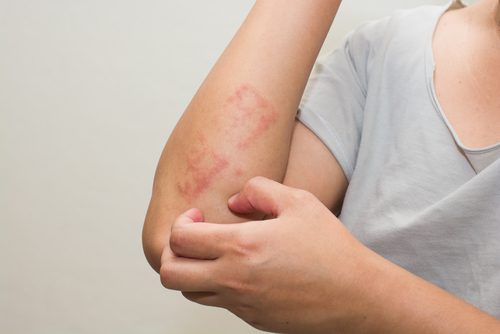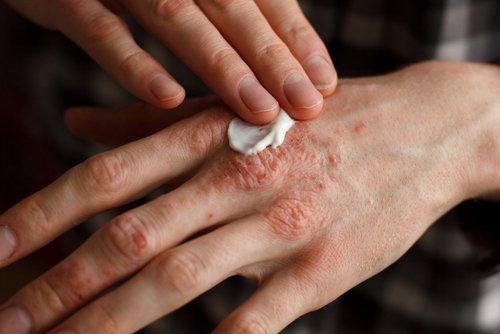Five Ways to Keep Psoriasis at Bay

As you try to keep psoriasis at bay, first know that it isn’t contagious. It can’t be transmitted between people. The worse thing that can happen is that it can spread to other parts of your body as it develops. Therefore, the question remains:
How can you prevent the annoying and unsightly psoriasis outbreaks?
This skin disease is a very common autoimmune disorder. The exact causes are unknown.
Psoriasis involves an excessive production and accumulation of skin cells. This gives rise to the appearance of red, dry, thick and flaky patches in certain areas such as elbows, knees, scalp, and even inside the eyes, among others.
The symptoms of psoriasis can be mild or severe, depending on the type and measures taken to treat it. Therefore, you should know what can trigger these outbreaks and how to improve your lifestyle in order to make the condition more bearable.
Psoriasis Outbreaks: Why Do They Occur?

Psoriasis manifests itself in different ways for each person. It all depends on the type of psoriasis and the affected person’s immune response. Plaque psoriasis is the most common type. It appears as thick, shiny patches of flaky skin usually accompanied by dryness, redness, itching and, sometimes, even pain.
According to the National Psoriasis Foundation, mild cases manifest as patches that cover up to 3% of the body. In contrast, the most severe cases of this condition can affect up to 10% of the skin.
Even though its exact causes are unknown, there are two key factors in common in most cases: genetics and the immune system. Also, there are certain environmental and lifestyle components that could affect the appearance or worsening of outbreaks. Even though some are difficult to avoid, others can be toned down in order to reduce the risk of complications.
The most common are:
- Infections in any part of the body
- Cigarette consumption
- Cuts or burns
- Constant exposure to stressful situations
- Dry air, either from the weather or from being in a room with artificial heating
- The intake of large amounts of alcohol
- Consumption of certain medications (such as lithium or drugs for high blood pressure)
- Having a vitamin D deficiency
- An excessive weight or obesity.
Discover: 15 Remedies To Cure Skin Fungus
Tips to Keep Psoriasis at Bay
For obvious reasons, the best keep psoriasis at bay, especially from spreading to other parts of your body, is to improve your lifestyle. This will allow you to lessen the possibility of triggers and, therefore, complement medical treatment.
1. Adopt a Healthy Diet

Maintaining a healthy diet is one of the essential habits you should adhere to in order to prevent outbreaks of psoriasis or make it worse. It’s essential for people afflicted with this condition to correct their eating habits.
Alcohol is a huge trigger, so you should either avoid it entirely or keep its consumption to a bare minimum. Also, reduce gluten and any other food that may cause irritation.
Instead, increase your intake of foods that are rich in omega 3, vitamin D, and antioxidants. For example, vegetables, fruits, and fish oil are representative of these.
However, it’s best to sit down with your MD and formulate a plan together. Nutritional needs vary from person to person.
2. Smoking Definitely Won’t Help Keep Psoriasis at Bay
Tobacco is as harmful as alcohol to patients with psoriasis. In fact, its consumption is classified as one of the main causes of the typical outbreaks of this condition.
Therefore, if you smoke and want to improve this condition, then either quit or reduce it to a minimum. There are many strategies out there to help you quit.
3. Protect Your Skin

Skin care plays a very important role in the prevention of psoriasis outbreaks. Because the disease directly affects your health, then habits must be reinforced in order to protect it from environmental factors.
Sunburn, pollution, and cuts will worsen your symptoms. For this reason, you must remember to:
- Apply sunscreen to your skin every day. Use gentle formulas that won’t cause allergies.
- Keep your skin well-moisturized using a cream for sensitive skin. In addition, stay hydrated by consuming plenty of fluids throughout the day.
- Also, be wary of cuts or scratches and give them appropriate treatment for fast healing. For this purpose, 100% pure raw honey is a great substance to apply.
- If possible, install a humidifier in your home or office or wherever it is you spend a lot of time at. It’ll minimize dryness.
- Avoid the use of perfumes or other harsh chemicals.
- Finally, stay away from very hot showers.
Read also: Your Intestinal Health is Related to Your Skin Health
4. Keep Psoriasis at Bay by Managing Your Stress
It’s very common that psoriasis gets worse when you’re feeling stressed. In addition, it’s also normal to feel stressed when the symptoms of psoriasis worsen or when they don’t seem to improve. However, it’s important that you keep your stress under control because they have a negative impact on this condition.
Try the following to reduce your stress:
- Have a flexible schedule at work.
- Dedicate time to pleasurable activities.
- Spend time with family and friends.
- Keep your body healthy through diet and exercise.
- Finally, adopt a relaxation routine that includes breathing exercises. Yoga and meditation are great for this. However, there are many others out there.
5. Sleep Well

You should sleep at least 7 to 8 hours a day without interruptions. This will do wonders to prevent your outbreaks of psoriasis.
Adhering to a proper sleeping schedule will strengthen your immune system, alleviate stress, and help you maintain your optimal weight. All of this together has a highly positive effect when it comes to keeping psoriasis at bay.
However, let’s not ignore that the symptoms of psoriasis can, in fact, lead to sleeping disorders. Therefore, adopt simple strategies such as wearing appropriate clothes at night. Design a comfortable environment in your room and avoid the use of distracting elements when you’re in it such as computers, mobile phones, and such.
Keep psoriasis at bay with all of the above recommendations. In addition, request regular medical check-ups to evaluate the state of your condition and to hear about other options you may have for its treatment.
All cited sources were thoroughly reviewed by our team to ensure their quality, reliability, currency, and validity. The bibliography of this article was considered reliable and of academic or scientific accuracy.
- Afifi, L., Danesh, M. J., Lee, K. M., Beroukhim, K., Farahnik, B., Ahn, R. S., … Liao, W. (2017). Dietary Behaviors in Psoriasis: Patient-Reported Outcomes from a U.S. National Survey. Dermatology and Therapy. https://doi.org/10.1007/s13555-017-0183-4
- Armstrong, A. W., Harskamp, C. T., Dhillon, J. S., & Armstrong, E. J. (2014). Psoriasis and smoking: A systematic review and meta-analysis. British Journal of Dermatology. https://doi.org/10.1111/bjd.12670
- Chapman, A., & El Miedany, Y. (2017). Psoriasis. In Comorbidity in Rheumatic Diseases. https://doi.org/10.1007/978-3-319-59963-2_4
- Menter, A., Gottlieb, A., Feldman, S. R., Van Voorhees, A. S., Leonardi, C. L., Gordon, K. B., … Bhushan, R. (2008). Guidelines of care for the management of psoriasis and psoriatic arthritis. Section 1. Overview of psoriasis and guidelines of care for the treatment of psoriasis with biologics. Journal of the American Academy of Dermatology. https://doi.org/10.1016/j.jaad.2008.02.039
- Basavaraj, K. H., Navya, M. A., & Rashmi, R. (2011). Stress and quality of life in psoriasis: An update. International Journal of Dermatology. https://doi.org/10.1111/j.1365-4632.2010.04844.x
- Gupta, M. A., Simpson, F. C., & Gupta, A. K. (2016). Psoriasis and sleep disorders: A systematic review. Sleep Medicine Reviews. https://doi.org/10.1016/j.smrv.2015.09.003
This text is provided for informational purposes only and does not replace consultation with a professional. If in doubt, consult your specialist.








